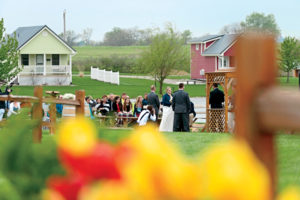So You Want to Start a Wedding Business?
Tips from those in the know on how to plan, build and keep it manageable and profitable.
By Claire Vath | Photos By Jason Dailey
When Danielle French moved from Toronto about 10 years ago to a 75-acre farm in Pontypool, Ontario, she envisioned her property and barn used for weddings, art instruction and culinary classes. French, who owns South Pond Farms believes “barns represent a way of life that is vanishing.… I believe that all social and economic inequalities disappear inside a barn,” she says. “People marvel at the structure … and I believe they are hanging onto this beauty.”
Going through the process of getting an old barn up to code and acquiring the proper permits does present some issues. Says Ann Arbor, Michigan-based barn architect and member of the National Barn Alliance Chuck Bultman, “The potential (for income, etc.) is astounding, but no one wants to talk about the reality of starting a business.”
Bultman continues, noting that, “to farm 1,000 acres, a farmer needs plenty of equipment and inputs and adherence to certain standards. The same is true for weddings. They need safe, legal spaces. Both of those things cost money. You are making an investment to get the income stream.”
Here are a few tips French and Bultman, and Diana Mellon offer when starting an event-hosting business that includes retrofitting or building a barn.
- Decide whether using an old barn is right for you. Whether you plan on hosting weddings or converting your barn for use in an agritourism endeavor, be mindful that safety is key. “First and foremost, there’s a liability toward people,” says Bultman. “There is a great chasm between meeting the code for an assembly use and just sweeping out your barn and charging thousands of dollars to allow someone to bring 300 people there for a party.” There are, he adds, fire, safety, environmental, accessibility and structural issues to consider.
- Do the math. As Bultman points out, the income potential is solid, but there may be significant investment in starting any type of barn-related business. Says French, “I invested well over $250,000 in retrofitting the barn, installing two kitchens, bringing everything up to meet fire, health and building codes.”
- Keep in mind that permitting processes aren’t always straightforward. “Permitting can be a complicated process, says Chuck Bultman. “The issue is that every jurisdiction—city, town, township, hamlet, village, etc.—has a different zoning code. Zoning codes aren’t a state issue, they’re a local issue.”
- Hire an Expert. Bultman has walked countless business owners through the processes of permitting and working with local zoning boards, but French went it alone. “I felt as though the officials were more adversarial in what I wanted to do with the property. At first, I started the process somewhat blindly, as I didn’t have what I am doing now in my mind—that may have been part of the problem.”
- Keep Neighbors in the Know. “People like what I’m doing, but they don’t want to see a ‘commercialization of the countryside,’” says French. “Neither do I. We all have to live together and accept or at least be open-minded to change, as long as that change is respectful of the community. I also need them to understand that this is my business, that it is my livelihood.” French meets with neighbors and invites them to functions, and guests must adhere to strict noise-level and traffic rules. “I also provide a few words of ‘being respectful on the property and on the roads’ that are part of general announcements made to wedding guests,” says French. She adds that she hopes in the long term that guests realize “that we are part of a greater community and long after they (guests) are gone, my family and our employees still live here.”
- Lay out all rules in a contract. Missouri’s Diana Mellon says she doesn’t have an alcohol license and doesn’t want one. “There are a lot of restrictions with alcohol. I have couples bring their own and they sign contracts stating that if anyone is underage or misbehaving, we can have them removed.” She adds that they haven’t had any problems, but they don’t allow events to go on past 11 p.m., and “if there is going to be more than four hours of alcohol consumption on the property, I ask the brides to have a security guard on hand.”
<< See the full story, “Barn Weddings Can Mean Big Income Boosts”







